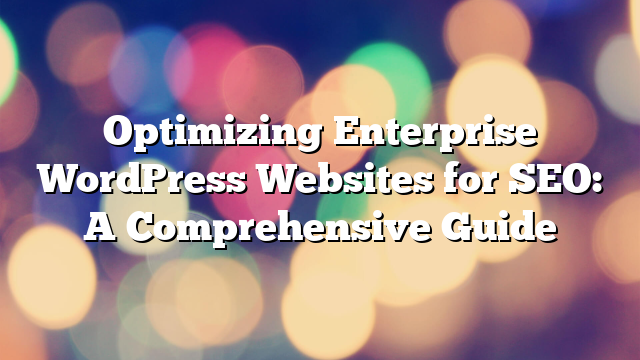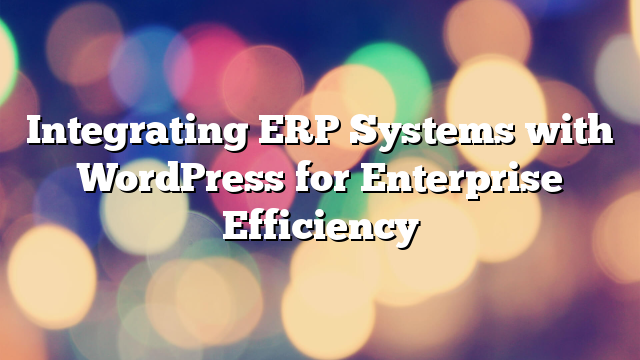Optimizing Enterprise WordPress Websites for SEO: A Comprehensive Guide
05.09.2024

In the competitive online landscape, search engine optimization (SEO) is crucial for driving traffic to your enterprise website. WordPress, when combined with the right strategies, can be a powerful platform for optimizing your site’s SEO performance. At our enterprise web development services, we specialize in enhancing WordPress websites to achieve top rankings in search engine results. This comprehensive guide explores how to optimize your enterprise WordPress website for SEO.
Why SEO is Essential for Enterprise Websites
For enterprises, having a website that ranks well on search engines is vital for visibility, brand reputation, and driving organic traffic. Effective SEO can help your business:
- Increase Visibility: Appear in top search results for relevant keywords, making it easier for potential customers to find you.
- Boost Credibility: High search rankings enhance your brand’s credibility and authority in your industry.
- Drive Organic Traffic: Attract more visitors to your website without relying solely on paid advertising.
- Improve User Experience: SEO best practices often align with better user experience, leading to higher engagement and conversions.
On-Page SEO Strategies for WordPress
On-page SEO involves optimizing individual pages on your website to rank higher and earn more relevant traffic. Here’s how to optimize your WordPress site:
- Keyword Research: Identify and target the keywords that your audience is searching for. Use tools like Google Keyword Planner or SEMrush to find high-value keywords.
- Optimized Content: Ensure your content is high-quality, relevant, and includes the targeted keywords naturally throughout the text.
- Title Tags and Meta Descriptions: Write compelling and keyword-rich title tags and meta descriptions for each page.
- Header Tags: Use header tags (H1, H2, H3) to structure your content, making it easier for search engines to understand the hierarchy of information.
- Image Optimization: Optimize images by compressing them, using descriptive file names, and adding alt text that includes relevant keywords.
- Internal Linking: Use internal links to connect related pages, helping search engines crawl your site more effectively and distributing page authority.
Technical SEO for WordPress
Technical SEO involves optimizing the backend structure of your website to improve its crawlability, indexability, and overall performance. Here are key technical SEO strategies for WordPress:
- Mobile Optimization: Ensure your website is fully responsive and provides a seamless experience on all devices. Use Google’s Mobile-Friendly Test tool to check your site’s mobile compatibility.
- Site Speed: Improve your site’s loading speed by optimizing images, enabling browser caching, and using a content delivery network (CDN).
- XML Sitemaps: Generate and submit an XML sitemap to search engines to help them understand your site structure and index your pages efficiently.
- Secure Your Site: Install an SSL certificate to ensure your website is served over HTTPS, which is a ranking factor for Google.
- Fix Broken Links: Regularly check for and fix broken links that can negatively impact user experience and SEO.
- Schema Markup: Implement schema markup to provide search engines with more detailed information about your content, enhancing your search visibility with rich snippets.
Optimizing WordPress with Plugins
WordPress offers a variety of plugins that can help you optimize your site for SEO. Some of the most effective plugins include:
- Yoast SEO: A comprehensive SEO plugin that helps with on-page optimization, XML sitemaps, breadcrumbs, and more.
- WP Rocket: A caching plugin that improves site speed by optimizing database queries, enabling browser caching, and compressing files.
- Smush: An image optimization plugin that compresses images without sacrificing quality, improving load times and performance.
- Broken Link Checker: A plugin that scans your site for broken links and missing images, helping you maintain a healthy link structure.
Content Strategy for SEO Success
Content is at the heart of SEO. To rank well, your content must not only be optimized but also provide value to your audience. Here’s how to develop a successful content strategy:
- Content Calendar: Plan your content in advance to ensure a consistent posting schedule that keeps your site fresh and relevant.
- Long-Form Content: Create in-depth, comprehensive content that addresses your audience’s pain points and questions, positioning your site as an authority.
- Use Multimedia: Incorporate images, videos, infographics, and other multimedia elements to make your content more engaging and shareable.
- User-Generated Content: Encourage user reviews, testimonials, and comments to increase engagement and add valuable content to your site.
- Update Old Content: Regularly review and update existing content to keep it relevant, accurate, and aligned with current SEO best practices.
Conclusion: Achieving SEO Success with WordPress
Optimizing your enterprise WordPress website for SEO is a continuous process that requires attention to both technical details and content strategy. At our enterprise web development services, we combine our expertise in WordPress with proven SEO strategies to help your site achieve higher rankings, increased traffic, and improved user engagement. Whether you’re starting from scratch or looking to enhance an existing site, our team can help you reach your SEO goals. Contact us today to learn how we can optimize your WordPress website for SEO success.



